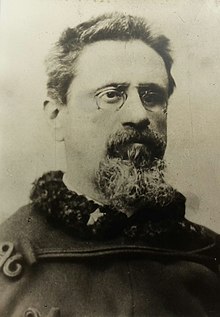
The Battle of Adwa was the climactic battle of the First Italo-Ethiopian War. Ethiopian army managed to defeat the heavily outnumbered invading Italian and Eritrean force led by Oreste Baratieri on March 1, 1896, near the town of Adwa. The decisive victory thwarted the campaign of the Kingdom of Italy to expand its colonial empire in the Horn of Africa. By the end of the 19th century, European powers had carved up almost all of Africa after the Berlin Conference; Ethiopia was among the few countries to still maintain their independence. Adwa became a pre-eminent symbol of pan-Africanism and secured Ethiopian sovereignty until the Second Italo-Ethiopian War forty years later.

Giuseppe Galliano was an officer of the Royal Italian Army, mostly known for his role during the First Italo-Ethiopian War. He perished in the Battle of Adwa and was posthumously awarded the Gold Medal of Military Valour.

Giovanni Romero (1841-1896) was an Italian colonel who participated in several conflicts during the 19th century. He participated in the Second Italian War of Independence and the Third Italian War of Independence, most notably leading the 4th Africa Infantry Regiment during the Battle of Adwa of the First Italo-Ethiopian War before being killed at the battle. Romero was also a posthumous recipient of the Gold Medal of Military Valour.
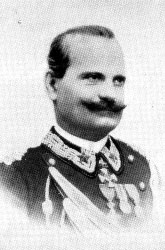
Vittorio Emanuele Dabormida, 2nd Count Dabormida, OSML, OCI was an Italian general and noble, mostly known for his role during the First Italo-Ethiopian War. He died in combat at Adwa, and was posthumously awarded the Gold Medal of Military Valor.

Raffaele Aversa was an Italian soldier and Resistance member, most notable for having carried out the arrest of Benito Mussolini after his dismissal as Prime Minister of Italy on 25 July 1943.
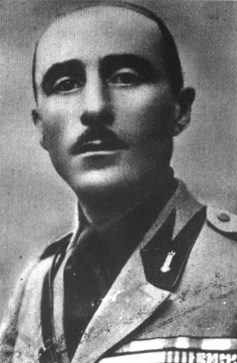
Enrico Francisci was an Italian Blackshirt general during World War II.

Vito Artale was an Italian general during World War II.
Augusto Ugolini was an officer in the Royal Italian Army during World War II, best known for his leadership during the battle of Culqualber, for which he was awarded the Gold Medal of Military Valor.

Pietro Zaglio was an Italian general during World War II.

Domenico Turitto was an Italian major who was part of the Royal Colonial Corps of Eritrea. He participated in the Mahdist War as he commanded the 1st Indigenous Infantry Battalion, occupying the city of Kassala and distinguishing himself at the Battle of Kassala. During the First Italo-Ethiopian War, Turitto commanded the vanguard of the Indigenous brigade under the command of Matteo Albertone before being killed in the battle. He was also a recipient of the Silver and Bronze Medals of Military Valor and a knight of the Order of Saints Maurice and Lazarus.

Umberto Masotto (1864-1896) was an Italian Captain who served in the First Italo-Ethiopian War. He commanded the 4th Mountain Artillery Battery during the Battle of Adwa but was more famously known for being the first field gunner to receive the Gold Medal of Military Valour.

Davide Menini was an Italian Lieutenant Colonel of the First Italo-Ethiopian War. He participated in the Battle of Custoza of the Third Italian War of Independence and commanded the 1st Africa Alpini Battalion during the Battle of Adwa before being killed in the battle.
Giuseppe Pavone was an Italian general during the interwar period and World War II.

Trentino La Barba was an Italian soldier and Resistance fighter during World War II.

Francesco De Rosa (1853-1896) was an Italian major of the First Italo-Ethiopian War. He commanded the 1st Artillery Brigade during the Battle of Adwa and was a posthumous recipient of the Gold Medal of Military Valor for his brave service in the battle before being killed in action.
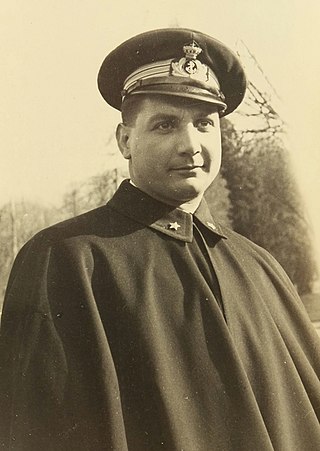
Alfeo Brandimarte was an Italian naval officer and Resistance member during World War II.
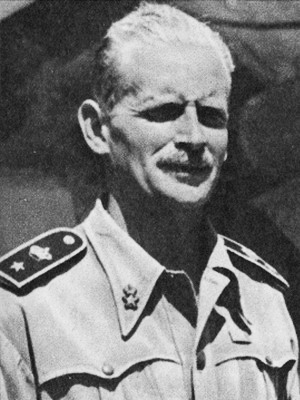
Giuseppe Cigala Fulgosi was an Italian naval officer during World War II.

Leopoldo Cesare Prato was an Italian major of the First Italo-Ethiopian War. He commanded the 6th African Infantry Battalion during the Battle of Adwa before being killed in the battle. He was also a posthumous recipient of the Gold Medal of Military Valor for his service in the battle.

Giuseppe Antonio Baudoin was an Italian major of the Third Italian War of Independence and the First Italo-Ethiopian War. He commanded the 9th Africa Infantry Battalion during the Battle of Adwa before being killed in the battle. He was a posthumous recipient of the Gold Medal of Military Valour for his service in the battle.
Alfonso Torelli was an Italian General who was killed in a battle against Libyan rebels.
